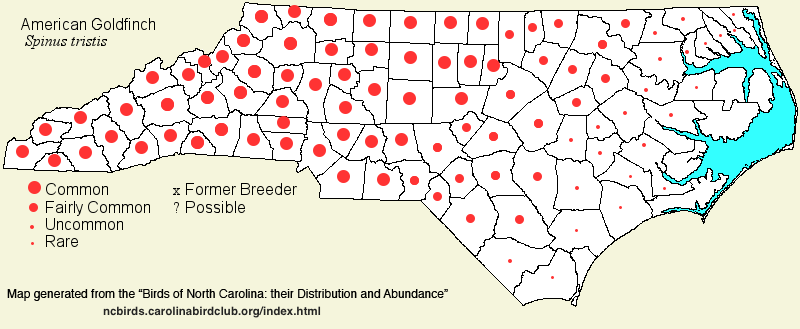 |  |
|
American Goldfinch - Spinus tristis FRINGILLIDAE Members: | Search Common: Search Scientific: |
|
|
|||||||
| General Comments | The American Goldfinch breeds from coast to coast, across the northern two-thirds of the United States and southern Canada. In North Carolina, it occurs in large numbers in the winter, and breeds over most of the state, excepting for the extreme eastern and southeastern parts of the state. Though a "Cardueline" -- now a "Fringillid" -- finch, it is generally not considered as a "winter finch", unlike nearly all other such species (except for House Finch) in the East and Far North. It has an unusual habit of being a very late nester, waiting until Jul and Aug for most of its reproductive activities; thus, distribution in Jun is not necessarily reflective of nesting in a local area. Goldfinches nest in brushy and edge habitats, such as old fields, wooded margins, and thickets. At other seasons, they tend to occur in moderate to large flocks, often with other species; they can be found in weedy fields, open woods and bottomlands (feeding high in trees on seeds such as Sweetgum), thickets, and in residential areas. They are often seen at feeders in cold weather. | ||||||
| Breeding Status | Breeder | ||||||
| NC BRC List | Definitive | ||||||
| State Status | |||||||
| U.S. Status | |||||||
| State Rank | S5B,S5N | ||||||
| Global Rank | G5 | ||||||
| Coastal Plain | Breeder over most of the region, and winter resident over the entire province; highly migratory. As a breeder, fairly common in the western third of the region, but mainly uncommon in the central portions, and rare in the eastern portion; absent or very rare in most coastal counties, being especially scarce in the southeastern corner and on the Pamlimarle peninsula. Nests southeast to about Croatan NF, but essentially not elsewhere in Carteret. Does not nest along the immediate coast. At other seasons, common to at times very common over the entire region. Mainly mid-Oct to mid- or late May in areas where it does not breed. Peak counts: 500, Whispering Pines (Moore), 27 Apr 1997. | ||||||
| Piedmont | Permanent resident, with strong migratory movements. As a breeder, fairly common to common over the region. At other seasons, common to at times abundant; variable in numbers from month to month, and from winter to winter. Probably less numerous in winter in the western portions. Peak counts: | ||||||
| Mountains | Permanent resident, with strong migratory movements. As a breeder, fairly common to common over most of the region, at most elevations, though not common at high elevations. At other seasons, common to at times very common, though not common at high elevations in winter. Peak counts: | ||||||
| Finding Tips |
None needed, at least from fall to spring. Usually can be found in a given day in summer, though less numerous at that season. **** | ||||||
| Attribution | LeGrand[2023-03-28], LeGrand[2014-01-05], LeGrand[2012-11-09] | ||||||
| NC Map Map depicts all counties with a report (transient or resident) for the species. | Click on county for list of all known species. |
| NC Breeding Season Map Map depicts assumed breeding season abundance for the species. |  |